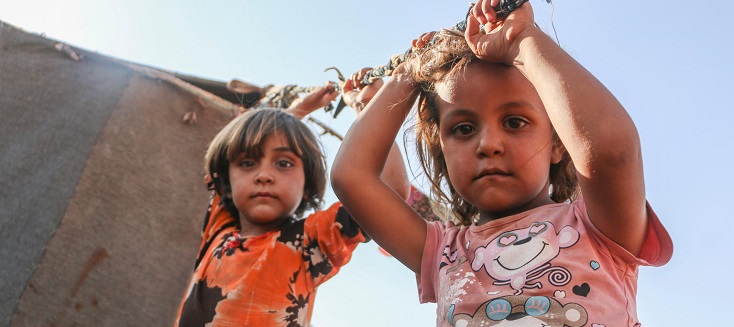With the Syrian conflict in its 13th year, the Syrian people remain trapped in a profound political, military, security, economic, humanitarian, and human rights crisis of almost unimaginable scale.
The Department of Political and Peacebuilding Affairs (DPPA) has been closely monitoring the evolving situation in Syria and the multifaceted conflict dynamics since peaceful protests erupted in March 2011. The United Nations supports the full implementation of Security Council resolution 2254 (2015) and the 2012 Geneva Communiqué, through its facilitation of an inclusive, credible, sustainable, Syrian-led political solution to the Syrian conflict, that meets the legitimate aspirations of the Syrian people to dignity, freedom and justice based on the principles of equality and non-discrimination.
In February 2012, the General Assembly passed resolution 66/253 requesting the UN to partner with the League of Arab States in support of a peaceful solution to the Syrian conflict through a political transition. This led to former UN Secretary-General Kofi Annan’s appointment as Joint Special Envoy. In April 2012, the Security Council adopted resolutions 2042 and 2043 endorsing Annan’s six-point plan and establishing the UN Supervision Mission in Syria (UNSMIS) to monitor and support its implementation. In June 2012, Annan convened a meeting where key international and regional stakeholders adopted the Geneva Communiqué, a document which aimed to strengthen the implementation of the six-point plan and chart a political way forward. To this day, the Communiqué continues to guide UN mediation efforts toward a political solution. The Geneva Communiqué was endorsed by the General Assembly in resolution 66/253-B in August 2012 and by the Security Council in resolution 2118 in September 2013.
In August 2012, following the departure of Kofi Annan, the Secretaries-General of the UN and the Arab League appointed Lakhdar Brahimi as their new Joint Special Representative. The Secretary-General convened an international conference (“Geneva II”) in January 2014, followed by intra-Syrian negotiations facilitated by Brahimi in Geneva. While the parties agreed on an agenda (transitional governing body; violence and terrorism; national institutions; reconciliation), they could not agree on the sequence for negotiating these issues. Brahimi suspended the negotiations and did not extend his assignment beyond May 2014.
The Secretary-General appointed Staffan de Mistura as Special Envoy for Syria in July 2014. Intense diplomatic engagement in 2015 between Russia and the US, and other key international stakeholders, resulted in the establishment of the International Syrian Support Group (ISSG) and the adoption of Security Council resolution 2254 (2015). Resolution 2254 (2015) reiterated the endorsement of the Geneva Communiqué and set the Special Envoy’s mandate. The resolution established a sequence and timeline for a political transition, including negotiations on the establishment of a credible, inclusive, non-sectarian governance and a process and timeline for drafting a new constitution. It also called for free and fair elections, including with the diaspora, pursuant to the new constitution and held under UN supervision.
In January 2019, Geir O. Pedersen succeeded de Mistura as Special Envoy for Syria. He currently leads the UN’s efforts to advance the full implementation of resolution 2254, including facilitation of the Syrian Constitutional Committee. Pedersen also continues to use his good offices in line with his mandate in resolution 2254 to engage the Syrian parties and all relevant regional and international players to discuss and advance his confidence-building step-for-step initiative focused on concrete, coordinated, reciprocal and verifiable measures that could offer Syrians tangible material benefits and protection guarantees, build some trust that will guide the conflict parties towards a political horizon and bring into being a real process to implement resolution 2254. Proposals in this regard are currently on the table but have yet to yield the needed engagement and mutual agreement to produce genuine progress.
Syrians have witnessed unprecedented devastation and displacement, compounded by gross and systematic violations and abuses of international law, humanitarian law and human rights law, including the use of internationally proscribed chemical weapons, mass incarceration and unlawful detention, forced disappearances, torture and other ill-treatment, extrajudicial killings, the indiscriminate bombing of civilians and civilian infrastructure such as hospitals and schools, sieges and severe access restrictions, and the use of starvation as a method of war. To this day, roughly half the pre-war population remains displaced inside or outside Syria—the largest displacement crisis in the world. Moreover, years of conflict, corruption and mismanagement, external economic shocks, large-scale illicit drug trafficking and sanctions have all collectively seen the Syrian economy go into a free fall. From a pre-war level of around 50 Syrian pounds to the US dollar in 2011, the official exchange rate has now increased more than two-hundred-fold to a record high of 13,000 per dollar, pushing more than 90 percent of the population below the poverty line. This situation is not only a source of tragedy for Syrians but a driver of instability across the region, with risks of greater conflagration compounded as a result of the Israel-Hamas war.
Impunity has been a hallmark of the Syrian conflict, has hindered conflict resolution efforts, and has challenged one of the UN’s core values—accountability. An important step to address accountability was made on 21 December 2016 when the General Assembly adopted resolution 71/248 to establish the International, Impartial, and Independent Mechanism (IIIM) to assist in the investigation and prosecution of the most serious crimes under international law, in particular the crimes of genocide, crimes against humanity and war crimes. Another important step was made on 29 June 2023 when the General Assembly adopted resolution 77/301 to create the Independent Institution on Missing Persons in the Syrian Arab Republic (IIMP), which aims to (1) to clarify the fate and whereabouts of missing persons in Syria and (2) provide adequate support to victims, survivors and the families of those missing—including through the set-up of a structural component that guarantees meaningful participation and representation of the victims, survivors, and families of missing persons.
OCHA http://www.unocha.org/syria
OHCHR http://www.ohchr.org/EN/Countries/MENARegion/Pages/SYIndex.aspx
Commission of Inquiry of the Human Rights Council (COI) http://www.ohchr.org/EN/HRBodies/HRC/IICISyria/Pages/IndependentInternationalCommission.aspx
UNHCR http://data.unhcr.org/syrianrefugees/regional.php
IIIM https://iiim.un.org/mandate/


